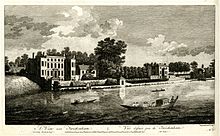Barnaby Backwell

Barnaby Backwell (died 3 October 1754) was the member of Parliament for Bishop's Castle, Shropshire, in 1754.
Early life
[edit]Barnaby Backwell was the second but first surviving son of Tyringham Backwell of Tyringham, Buckinghamshire, and Elizabeth, daughter of Sir Francis Child, Lord Mayor of London.[3] He was the grandson of the financier Edward Backwell.
Career
[edit]Backwell was a partner in the bank of Samuel and Francis Child,[4] and was said to have an income of £4,000 per annum.
In the General election of 1754, he was elected to Parliament for Bishop's Castle, a "rotten borough", where his uncle Samuel Child had been the M.P. until his death in 1753. The borough was under the control of the Walcots, who owed a great deal of money to Child's Bank. Backwell was classified as a Tory in Dupplin's list of 1754.[5]
He died the following October. He had married twice, firstly Margaret (d. 1745), the daughter of Samuel Clarke, a London merchant, and secondly Sarah Gibbon, with whom he had a son and three daughters. His daughter, Elizabeth Tyringham, married William Praed.
References
[edit]- ^ A View near Twickenham. British Museum. Retrieved 26 October 2016.
- ^ Dr William Battie. Twickenham Museum. Retrieved 26 October 2016.
- ^ BACKWELL, Barnaby (d.1754), of Tyringham, Bucks. The History of Parliament. Retrieved 26 October 2016.
- ^ Edward Backwell. RBS. Retrieved 26 October 2016.
- ^ BACKWELL, Barnaby (d.1754), of Tyringham, Bucks. The History of Parliament. Retrieved 26 October 2016.
External links
[edit]
